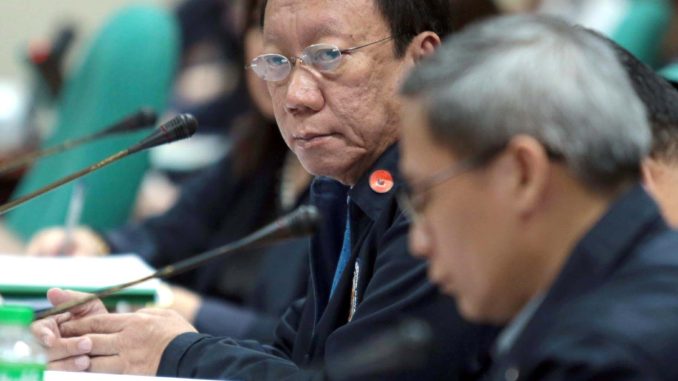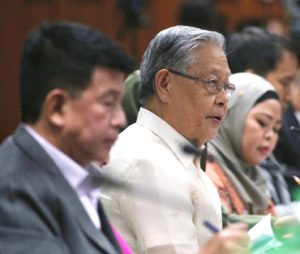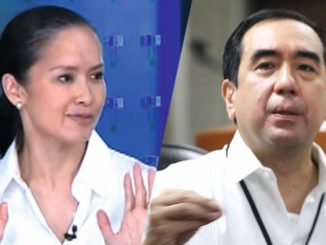
By TONY LOPEZ
Section 1, Article XVII of the Philippine Constitution provides two ways to amend the Constitution:
By: (1) The Congress, upon a vote of three-fourths of all its Members; or (2) A constitutional convention.”
This provision does not specify whether Congress is to vote jointly or separately.
At the celebration by Philconsa of the Constitution Day on Feb. 12, 2018, Solicitor General Jose Calida spoke on the nuances and ramifications of this provision, and whether voting should be jointly with the Senate as a single body, or separately, with the Senate voting by itself.
The SolGen came to Philconsa with considerable gravitas. He has never lost a Supreme Court case, he told his jampacked audience. He sent Senator Leila de Lima to jail. He got SC approval to extend martial law until the end of 2018. He got 100 in Criminal Law, 90 in two other subjects. He would have landed in the Top Ten but he was very sick during the bar exams.
Senate wants separate winning
 The Senate insists on separate voting. The House of Representatives prefers joint voting, and thinks it can proceed without the Senate and still obtain the needed supermajority.
The Senate insists on separate voting. The House of Representatives prefers joint voting, and thinks it can proceed without the Senate and still obtain the needed supermajority.
Some even believe that the question is political in nature, hence cannot be settled using a legal framework.
In his Philconsa speech, SolGen Calida narrated a credible, reasonable and thoughtful interpretation of both sides.
While conceding that the issue of voting jointly or separately could be a political question, Calida said his position “is that it is actually a legal one or, at the very least, a justiciable question.” Meaning, the Supreme Court should vote on it, for or against.
The arguments for voting separately:
- Voting separately is the norm for Congress.
In all but one of the provisions where the manner of voting is specified, Congress is made to vote separately. This may lend credence to the argument that the two houses of congress should vote separately when it comes to other matters as well, such as when they propose Constitutional amendments or revisions.
- The general rule is that the Houses of Congress should vote separately, in line with the bicameral nature of our Legislature.
- It is more appropriate to turn to the three principles of constitutional construction in the attempt to arrive at an answer.
First, verba legis, that is, wherever possible, the words used in the Constitution must be given their ordinary meaning except where technical terms are employed. Guided by the plain meaning rule, it may be argued that the term Congress under Article XVII, Section 1 of the 1987 Constitution should be interpreted as referring to the two separate bodies of Congress.
Second, where there is ambiguity, resort to ratio legis est anima. The words of the Constitution should be interpreted in accordance with the intent of its framers. It appears that the intent of the framers was for Congress to vote separately when proposing amendments and revisions to the Constitution. In Chavez v. Judicial and Bar Council, the Supreme Court ruled,
[T] he exercise of legislative and constituent powers requires the Senate and House of Representatives to coordinate and act as distinct bodies in furtherance of Congress’ role under our constitutional scheme.
Further, in Sanidad v. COMELEC, the Supreme Court held that the power to propose amendments and revisions to the Constitution, is but a part of legislative powers. Hence, inasmuch as the manner of voting in the exercise of legislative powers is done separately, the exercise of constituent powers should likewise be voted on separately.
 Lastly, ut magis valeat quam pereat. The Constitution is to be interpreted as a whole. A reading of the 1987 Constitution reveals that it is only in Section 18, Article VII that Congress was expressly allowed to vote jointly, that is, in revoking or extending the proclamation of martial law and the suspension of the privilege of the writ of habeas corpus. By the maxim of expressio unius est exclusion alterius, it is therefore, only under said section that Congress votes jointly, not separately.
Lastly, ut magis valeat quam pereat. The Constitution is to be interpreted as a whole. A reading of the 1987 Constitution reveals that it is only in Section 18, Article VII that Congress was expressly allowed to vote jointly, that is, in revoking or extending the proclamation of martial law and the suspension of the privilege of the writ of habeas corpus. By the maxim of expressio unius est exclusion alterius, it is therefore, only under said section that Congress votes jointly, not separately.
The arguments for voting jointly (that is the Senate vote of 24 being diluted by more than 200 members of the House:
- The words employed by Section 1, Article XVII are unambiguous. It states “any amendment to, or revision of this Constitution may be proposed by the Congress, upon a vote of three-fourths of all the Members.”
The word “Congress” plainly means both houses, the Senate and the House of Representatives.
A “vote of three-fourths of all its Members” pertains to both houses of Congress. It does not need any further interpretation. Calida says requiring “a vote of three-fourths of all its Members” signifies “joint” voting. There is nothing there which even remotely suggests voting separately. Moreover, the 1987 Constitution employs precise language in laying down the functions and duties of the two houses of Congress.
Even if the present constitution had been initially drafted with a unicameral legislature in mind, the provisions of the 1987 Constitution as ratified by the Filipino people have been sufficiently adjusted to reflect the shift to bicameralism where it is relevant. Several provisions in Article VII demonstrate this, such as Sections 4, 9, and 18 which all specify the manner of voting.
- The omission of the phrase “voting separately” in Section 1, Article XVII, when other provisions in the Constitution specify such requirement, indicates the intent of joint voting.
- The bicameral nature of Congress is principally meant for its legislative functions. Per Justice Isagani Cruz, when Congress convenes as a “Constituent Assembly,” it is performing a function not legislative in nature.
In Gonzales vs. COMELEC, when members of the Senate and the House exercise their powers to propose Constitutional amendments or revisions, they act not as members of Congress doing legislative work but as members of a Constituent Assembly drafting proposals to amend or revise the Constitution.
Acting therefore as members of the Constituent Assembly and not as legislators, Congress should vote jointly, as is implied from the phrase “all members of Congress,” insists Calida.



